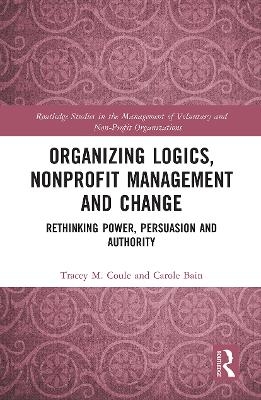
Organizing Logics, Nonprofit Management and Change
Rethinking Power, Persuasion and Authority
Seiten
2021
Routledge (Verlag)
978-0-367-37100-5 (ISBN)
Routledge (Verlag)
978-0-367-37100-5 (ISBN)
Nonprofit organizations are conventionally positioned as generators of social and cultural forms of capital for the common good. Recent years, however, have seen professionalization promoted widely by funders, policy-makers and nonprofit practitioners across the globe.
Nonprofit organizations are conventionally positioned as generators of social and cultural forms of capital for the common good. As such they occupy a different space to other types of organizations such as corporate firms that exist primarily to generate economic capital for private owners/shareholders.
Recent years, however, have seen professionalization promoted widely by funders, policy-makers and nonprofit practitioners across the globe. At the same time, there has been an increasing cross-over of employees from private and public bodies into nonprofits. But do such shifts open up space for the wholesale importation of managerialism into and commercialization of the nonprofit sphere? Are nonprofits at risk of being reconstituted as primarily economic entities, serving the interests of a leadership elite? How are such changes in an organization’s trajectory brought about? What are the consequences for trustees, staff, members and the nature of managerial work? The authors engage with critical questions such as these through a unique insider account of one professional institute experiencing unprecedented changes that challenge its very reason for being. Drawing on a three-year ethnography, they narrate organizational inhabitants’ struggles in their search for purpose and analyze the myriad of changes within different aspects of organizing including structure, strategizing, pay and reward, governance and leadership.
The book will enable readers to reframe and rethink organizational change as a process involving power, persuasion and authority, and will be of value to researchers, students, academics and practitioners interested in managerial work and organizational change in non-profit organizations.
Nonprofit organizations are conventionally positioned as generators of social and cultural forms of capital for the common good. As such they occupy a different space to other types of organizations such as corporate firms that exist primarily to generate economic capital for private owners/shareholders.
Recent years, however, have seen professionalization promoted widely by funders, policy-makers and nonprofit practitioners across the globe. At the same time, there has been an increasing cross-over of employees from private and public bodies into nonprofits. But do such shifts open up space for the wholesale importation of managerialism into and commercialization of the nonprofit sphere? Are nonprofits at risk of being reconstituted as primarily economic entities, serving the interests of a leadership elite? How are such changes in an organization’s trajectory brought about? What are the consequences for trustees, staff, members and the nature of managerial work? The authors engage with critical questions such as these through a unique insider account of one professional institute experiencing unprecedented changes that challenge its very reason for being. Drawing on a three-year ethnography, they narrate organizational inhabitants’ struggles in their search for purpose and analyze the myriad of changes within different aspects of organizing including structure, strategizing, pay and reward, governance and leadership.
The book will enable readers to reframe and rethink organizational change as a process involving power, persuasion and authority, and will be of value to researchers, students, academics and practitioners interested in managerial work and organizational change in non-profit organizations.
Tracey M. Coule, PhD, is Professor of Nonprofit Work and Organization at Sheffield Hallam University. Carole Bain, DBA, is Executive Education Fellow at the University of Sheffield Management School.
1. Introduction. Part I - A tale of Two Rhetorics: Organizational life in the Milieu of Corporate and Community Logics. 2. An Organization in Search of Purpose. 3. Managers in Search of Purpose. 4. Symbols, Rhetoric and Strategizing. Part II - Transforming Organizational Trajectory. 5. Structuring for Purpose. 6. Rewarding Loyality to the (New) Cause. 7. Immobilizing Resistance and Overcoming Dissent. 8. Leading Away from Purspose and Getting Away with It. 9. Conclusion.
| Erscheinungsdatum | 25.02.2021 |
|---|---|
| Reihe/Serie | Routledge Studies in the Management of Voluntary and Non-Profit Organizations |
| Zusatzinfo | 11 Tables, black and white; 15 Line drawings, black and white; 15 Illustrations, black and white |
| Verlagsort | London |
| Sprache | englisch |
| Maße | 152 x 229 mm |
| Gewicht | 453 g |
| Themenwelt | Wirtschaft ► Betriebswirtschaft / Management ► Planung / Organisation |
| Wirtschaft ► Volkswirtschaftslehre | |
| ISBN-10 | 0-367-37100-6 / 0367371006 |
| ISBN-13 | 978-0-367-37100-5 / 9780367371005 |
| Zustand | Neuware |
| Haben Sie eine Frage zum Produkt? |
Mehr entdecken
aus dem Bereich
aus dem Bereich
ein Leitfaden zur Gestaltung sinnstiftender Formen der Zusammenarbeit
Buch | Softcover (2024)
Vahlen (Verlag)
29,80 €
Basiswissen – Unternehmensbewertung – Ablauf von M&A
Buch | Softcover (2024)
Erich Schmidt Verlag
39,95 €
Der Weg zu einer dialogorientierten Organisationsentwicklung
Buch | Softcover (2021)
Vahlen, Franz (Verlag)
44,90 €


